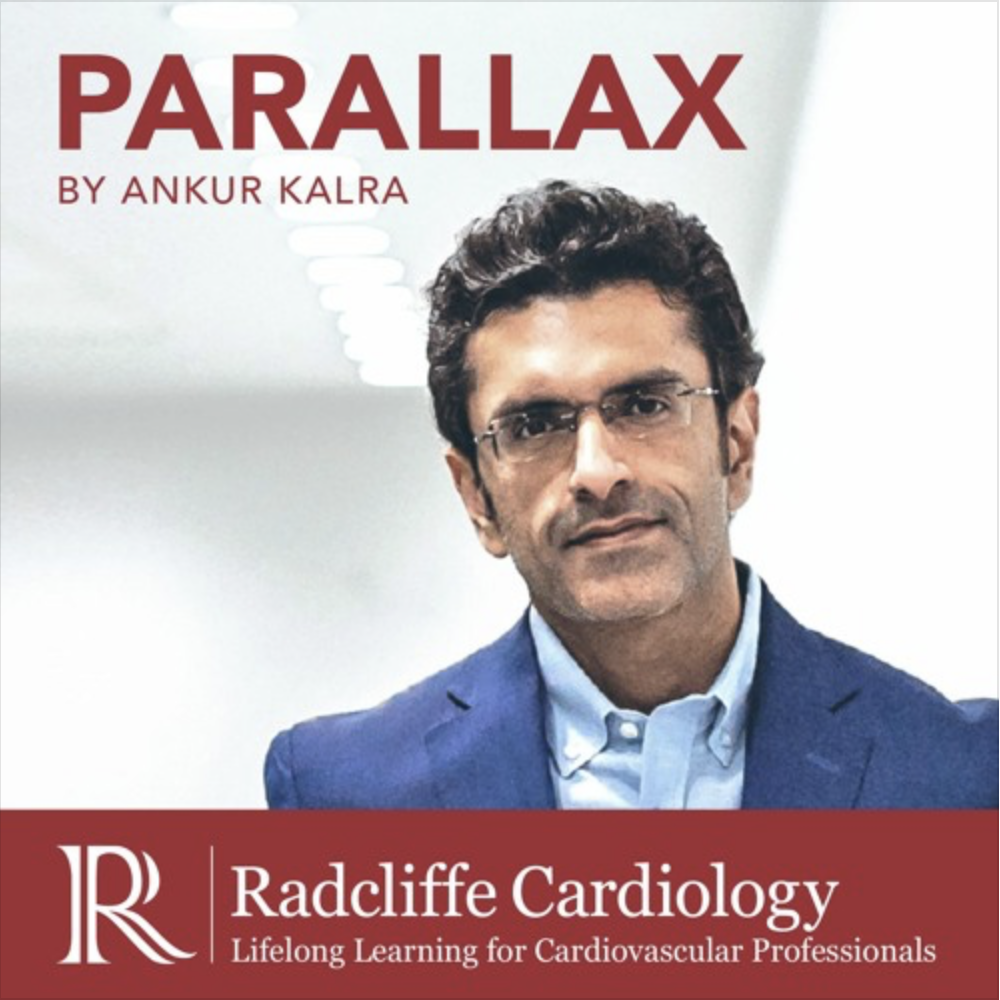
24: COVID-19 Lessons And Learnings From Italy With Prof Michele Senni
“It’s a tsunami not just a wave. The worst tsunami you can imagine”
Prof Michele Senni is Director of Cardiology at Papa Giovanni XXIII Hospital, Bergamo Italy. He contracted COVID-19 himself and in this latest podcast he meets with Ankur Kalra, MD to discuss his personal experience in dealing with patients and COVID-19 in Europe’s outbreak epicentre.
Hear them discuss the burden on healthcare, patient selection, the importance of testing and PPE and how COVID has resulted in a reduction of acute myocardial infarction and heart failure in patients.
Submit your question to Ankur via: podcast@radciffe-group.com. Hosted by @AnkurKalraMD. Produced by @RadcliffeCARDIO.
Read MoreRead Less
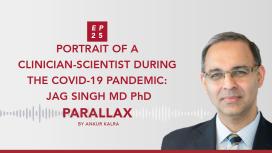
A week after Jag Singh had tested positive for 2019-nCoV, he became a patient in his hospital’s intensive care unit. This week he joins Ankur Kalra, MD to tell us about his journey as a clinician-scientist.
Jagmeet P Singh, associate chief of the cardiology division at Massachusetts General Hospital and professor of medicine at Harvard Medical School joins Ankur Kalra for a deep conversation about his journey across three continents. Dr Singh talks about the importance of choosing fulfilment over success. We gain more insights on the recent late-breaking trial, MADIT-CHIC focusing on cardiac resynchronization therapy. Ankur asks Jag about his experience of being on the other side of the healthcare system and his enrolment in the since halted remdesivir trial.
Read More
Jagmeet P Singh, associate chief of the cardiology division at Massachusetts General Hospital and professor of medicine at Harvard Medical School joins Ankur Kalra for a deep conversation about his journey across three continents. Dr Singh talks about the importance of choosing fulfilment over success. We gain more insights on the recent late-breaking trial, MADIT-CHIC focusing on cardiac resynchronization therapy. Ankur asks Jag about his experience of being on the other side of the healthcare system and his enrolment in the since halted remdesivir trial.
All Episodes
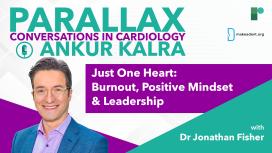
Tune in for a rich discussion with Dr Jonathan Fisher and Dr Ankur Kalra on the future of healthcare, well-being, and rediscovering the human connection at the heart of medicine. Find out more about the bestselling book Just One Heart: A Cardiologist’s Guide to Healing, Health, and Happiness.
Read More
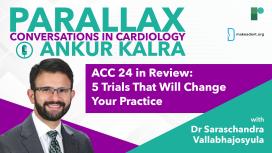
Dr Kalra and Dr Vallabhajosyula dissect the practical implications of the top 5 ACC.24 trials, answering pressing questions and addressing emerging dilemmas.
Read More
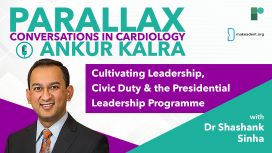
In this episode, Dr Sinha shares his insights on leadership after participating in the prestigious Presidential Leadership Scholars Programme.
Read More
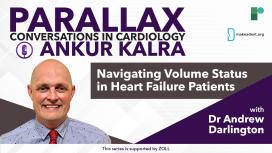
In this informative episode of Parallax, Dr Ankur Kalra is joined by Dr Andrew Darlington, an Advanced Heart Failure Cardiologist at Piedmont Heart Institute in Georgia.
Together, Dr Kalra and Dr Darlington delve into the significance of assessing volume status in patients with heart failure, highlighting its continued relevance in 2024, including the availability of new diagnostic tools, including the Heart Failure Management System (HFMS).
This series is supported by ZOLL and is intended for Health Care Professionals.
Read More
Together, Dr Kalra and Dr Darlington delve into the significance of assessing volume status in patients with heart failure, highlighting its continued relevance in 2024, including the availability of new diagnostic tools, including the Heart Failure Management System (HFMS).
This series is supported by ZOLL and is intended for Health Care Professionals.
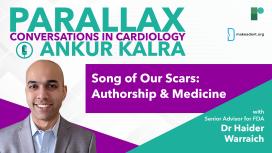
In this week's Parallax episode, Dr Ankur Kalra welcomes Dr Haider Warraich, a cardiologist at Brigham and Women's Hospital. Dr Warraich is not only a Senior Advisor for Chronic Disease to the FDA Commissioner but also a prolific author, having written three books, including "Song of Our Scars: The Untold Story of Pain." He is a regular contributor to publications like the New York Times and the Washington Post.
Read More
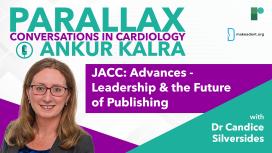
Dive into the unique synergy between her clinical practice and editorial leadership as Dr Silversides shares her vision for the journal. Learn how she navigates diverse responsibilities, manages peer reviews, and ensures fair evaluation of the submitted manuscripts. Get insights into launching a journal, from adapting to the needs of the readership and editorial board selection to time management. Dr Silversides joins Dr Kalra in exploring the evolving landscape of academic publishing, discussing the challenges and opportunities presented by AI and other advancements.
Read More
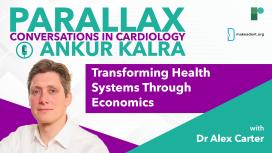
The podcast embarks on an exploration of the program's three fundamental pillars: health economics, outcomes measurement, and management. Dr. Carter underscores the importance of efficiently allocating scarce resources, evaluating health system performance through population outcomes, and translating theoretical knowledge into practical application through leadership.
Read More
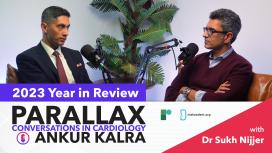
Dr Ankur Kalra welcomes back Dr Sukhjinder Nijjer for their much-anticipated annual review of advancements in cardiovascular medicine that defined the year 2023.
Read More
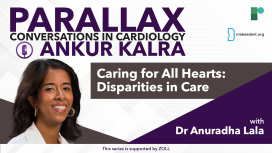
In this thought-provoking episode, Dr Ankur Kalra is joined by Dr Anuradha Lala. They delve into the critical topic of disparities in care within the healthcare system from a cardiologist's point of view and explore actionable steps towards a more inclusive and fair healthcare landscape.
This series is supported by ZOLL and is intended for Health Care Professionals.
Read More
This series is supported by ZOLL and is intended for Health Care Professionals.
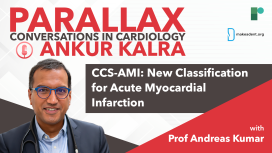
In this informative episode, Dr Kumar shares what led his team and the CCS to introduce a new classification scheme for acute MI. He discusses how research from the past 15 years highlighted the need to incorporate tissue changes resulting from acute myocardial infarction (MI) into clinical practice. Dr Kumar outlines the four stages of CCS-AMI, and we gain insight into how this novel classification scheme could impact bedside medicine.
Read More

This week Parallax welcomed its first non-physician/researcher guest: health advocate Lindsay Davis. Lindsay, ballerina with ambitions to study at Julliard, was experiencing the symptoms of hypertrophic cardiomyopathy (HCM) from her early teens, but she had not been diagnosed until she was 17.
In this episode Ankur asks Lindsay about her treatment path. Lindsay recalls her own journey to taking control of her condition and the important role of information in patient adherence. Lindsay, former Miss Ohio, talks how she used the pageant to create awareness. Lindsay talks about work in state legislation and her plans for 2021.
Read More
In this episode Ankur asks Lindsay about her treatment path. Lindsay recalls her own journey to taking control of her condition and the important role of information in patient adherence. Lindsay, former Miss Ohio, talks how she used the pageant to create awareness. Lindsay talks about work in state legislation and her plans for 2021.

In 2020, women still only represent 16% of editorial boards.
US Cardiology Review journal, has recently seen a 7-fold increase in female editorial board members in response to journal-based strategic initiatives and the stellar work of USC editorial board leadership, Ankur Kalra (Editor in Chief) and Bill Gogas (Deputy Editor in Chief), who were keen to drive this change. With thanks to Dr Anastasia Mihailidou’s tenure as a new board member and her suggested nominees, ten new female board members have recently joined US Cardiology Review’s editorial board.
Read More
US Cardiology Review journal, has recently seen a 7-fold increase in female editorial board members in response to journal-based strategic initiatives and the stellar work of USC editorial board leadership, Ankur Kalra (Editor in Chief) and Bill Gogas (Deputy Editor in Chief), who were keen to drive this change. With thanks to Dr Anastasia Mihailidou’s tenure as a new board member and her suggested nominees, ten new female board members have recently joined US Cardiology Review’s editorial board.

One of the first things painted by the young Mike Gibson, today Professor of Medicine at Harvard, researcher and interventional cardiologist, was a cloud. Years later while painting angiograms Dr Gibson came up with the idea of myocardial blush: The blush was that cloud of dye in the heart muscle.
In this episode, Mike opens up about his childhood in Stilwell, Oklahoma. Ankur and Mike discuss how the inductive quality of art can complement the deductive principles of science. Mike recalls earlier stages of his career and warns about the blinding effect of the ego-driven, competitive culture of cardiology. Ankur asks Mike about fatherhood and about his role as an educator.
What does it mean to be fearless as a medical professional? How can you protect yourself from the emotional toll of the profession? What is Mike’s advice to early career cardiologists?
Sponsored by Edwards.
Read More
In this episode, Mike opens up about his childhood in Stilwell, Oklahoma. Ankur and Mike discuss how the inductive quality of art can complement the deductive principles of science. Mike recalls earlier stages of his career and warns about the blinding effect of the ego-driven, competitive culture of cardiology. Ankur asks Mike about fatherhood and about his role as an educator.
What does it mean to be fearless as a medical professional? How can you protect yourself from the emotional toll of the profession? What is Mike’s advice to early career cardiologists?
Sponsored by Edwards.

In this week’s episode Ankur Kalra asks Dr Suzanne J Baron, Director of Interventional Cardiovascular Research at Lahey Hospital & Medical Center: How do we measure the value of a novel technology?
During her interventional cardiology fellowship, Dr Baron became fascinated by the implementation of novel technologies. She earned her degree in Clinical Epidemiology and spent a year working at the FDA’s Device Evaluation unit.
In 2019 Dr Baron presented the results of her late-breaking trial, COAPT. Ankur invites Suzanne to discuss the economic analysis of the study and to give a short introduction to cost-effectiveness analysis. Suzanne provides an overview of the trial and they talk about the importance of understanding the value and benefits of new devices from both the patient and the health-economic point of viewpoint.
Read More
During her interventional cardiology fellowship, Dr Baron became fascinated by the implementation of novel technologies. She earned her degree in Clinical Epidemiology and spent a year working at the FDA’s Device Evaluation unit.
In 2019 Dr Baron presented the results of her late-breaking trial, COAPT. Ankur invites Suzanne to discuss the economic analysis of the study and to give a short introduction to cost-effectiveness analysis. Suzanne provides an overview of the trial and they talk about the importance of understanding the value and benefits of new devices from both the patient and the health-economic point of viewpoint.

In this week’s Parallax, host Ankur Kalra is joined by Charles (Chuck) Simonton, Vice President and Chief Medical Officer of Abiomed. Chuck talks about how his father’s leadership and service as a Methodist minister inspired him to become a doctor. He recalls the dawn of interventional cardiology: the birth of angioplasty and stenting. Drawing from his experiences as a trialist who worked with some of the most influential minds, he offers practical tips to young doctors. Finally, Ankur asks Chuck about the Impella device controversy and the recent decision of Abiomed to accelerate their clinical research.
How should you start building a research programme? What are Chuck Simonton’s thoughts on the relationship between doctors and the industry? What is Chuck’s message to young cardiologists?
Read More
How should you start building a research programme? What are Chuck Simonton’s thoughts on the relationship between doctors and the industry? What is Chuck’s message to young cardiologists?





